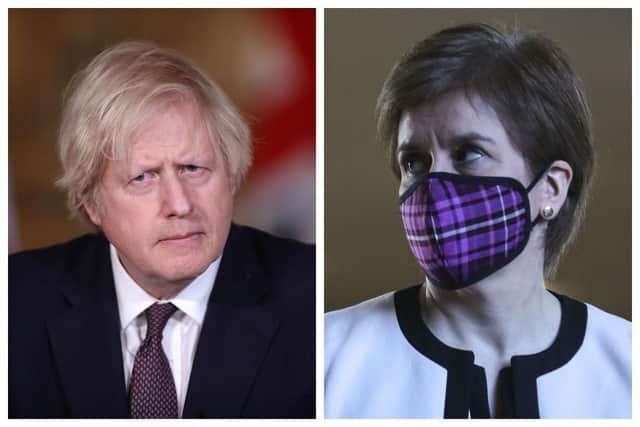Covid Scotland: Why have the UK and Scottish governments gone down different paths on restrictions?
On Tuesday, the Prime Minister told the public that England plans to “ride out” the current onslaught of infections, rather than imposing any further restrictions.
In doing so, he admitted parts of the NHS would be “temporarily overwhelmed” – previously what governments of all colours across the UK’s four nations have worked to avoid.


Advertisement
Hide AdAdvertisement
Hide AdDaily tests for critical workers, not unlike the way COP26 delegates were asked to take a lateral flow test each day before heading to the conference in Glasgow, will be rolled out for key industries
Speaking to a virtual meeting of the Scottish Parliament on Wednesday, the First Minister announced she would follow the rest of the UK on self-isolation.
Those testing positive in Scotland will now need to self-isolate for just seven days, providing they return a negative test on day six and another one at least 24 hours later.
Fully vaccinated close contacts will also be freed from self-isolation if they return a negative lateral flow test every day for seven days.
These changes come just weeks after Ms Sturgeon criticised a journalist for asking whether self-isolation rules could be relaxed to help businesses deal with staff shortages.
It would be intriguing to hear whether her argument such changes would result in more cases of Omicron is still where the SNP leader stands.
However, from a degree of divergence prior to Christmas, the four nations of the UK are back to mostly mirroring each other on public health rules.
Should Omicron take a turn for the worst across the UK, however, we will likely again see a repeat of the late December constitutional fights and clashes of leadership.
Advertisement
Hide AdAdvertisement
Hide AdScotland’s two leaders are in vastly different places when it comes to their ability to push any additional restrictions through their respective parliaments should it be required.
The First Minister retains the confidence of almost the entirety of her own backbenches, and would be backed by the Scottish Greens and arguably Scottish Labour should new restrictions be proposed.
Mr Johnson, meanwhile, would be forced to put any new restrictions in front of a Conservative party that abandoned him to the whims of Sir Keir Starmer’s party when voting through Plan B.
Put bluntly, the Prime Minister cannot afford another high-profile rebellion among his own foot soldiers without risking his own survival as leader.
The pandemic has reached a key juncture where the public has become jaded by restrictions and numb to high case numbers, hospitalisations and deaths.
Ms Sturgeon is also hamstrung by a lack of money and willpower to go far beyond English restrictions without significant financial measures such as furlough, leaving her partially dependent on UK Government decision making.
Her inherent caution versus Mr Johnson’s preferred brand of bumbling optimism also explains the pace of changes to self-isolation measures.
Fundamentally, however, each leader’s response to Covid-19 is now about what is politically survivable and not necessarily driven by public health arguments.
A message from the Editor:
Thank you for reading this article. We're more reliant on your support than ever as the shift in consumer habits brought about by coronavirus impacts our advertisers.
If you haven't already, please consider supporting our trusted, fact-checked journalism by taking out a digital subscription.
Comments
Want to join the conversation? Please or to comment on this article.

